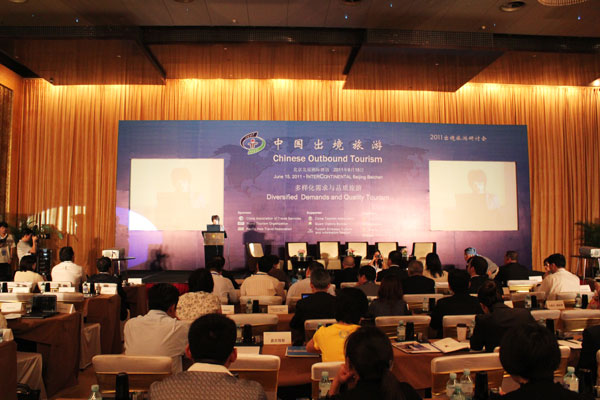Chinese Tourists Choose Quality over Price
 |
|
The 7th International Forum on Chinese Outbound Tourism opens in Beijing on Wednesday, with tourism operators and government representatives from nations including Turkey, Germany, Spain and Guam and the United States in attendance. [Photo/CRIENGLISH.com] |
Over 72% of Chinese outbound tourists prefer high quality travel products to budget alternatives, even though the price may be much higher, according to a survey by Ivy Alliance Tourism Consulting Company conducted in 2010.
The survey results have been published at this year's International Forum on Chinese Outbound Tourism (IFCOT) which opened in Beijing on Wednesday.
Among the 1.5 million Chinese tourists who traveled to American countries in 2010, 58% of them were aged between 36 and 55, and 86% of them had a monthly income of over 5000 yuan.
"Statistics show that senior Chinese are an emerging group of outbound travelers. They not only have time but also strong financial capacity for travel," observed Wang Xinjun, Managing Director of the Ivy Alliance Tourism Consulting Company, organizer of the forum.
Dr. Wang, as one of the founders of the IFCOT, also pointed out that Chinese tourists spend much more compared with their international counterparts. This phenomenon was especially evident when they are visiting European countries. For instance, the company's survey for 2010 shows that the average amount of money each Chinese tourist to Europe spent on shopping is nearly 30 thousand yuan. Most of the spendings were on cosmetics, clothes and local crafts.
An analysis report on "Status and Trends of Chinese Outbound Travel Market" was also released at the forum.
The report shows that the top ten 'first arrival' destinations for Chinese outbound departures last year included Japan, South Korea, Vietnam, the U.S., Australia and Singapore.
Chinese tourists tend to emphasize the level of safety, popularity and how well organized the route is, when it comes to choosing an outbound travel product, the report states.
The report also suggests that as Chinese travelers gain more traveling experiences and their incomes and education levels rise, there will be an increasing demand for high quality products.
In addition to the results of the report being published, the forum also featured a series of discussions by travel experts and representatives from major travel agencies in China.
The forum also attracted two delegations of tourism bureau officials from Turkey and Guam, United States, to hold presentations separately in order to promote their local travel resources.














